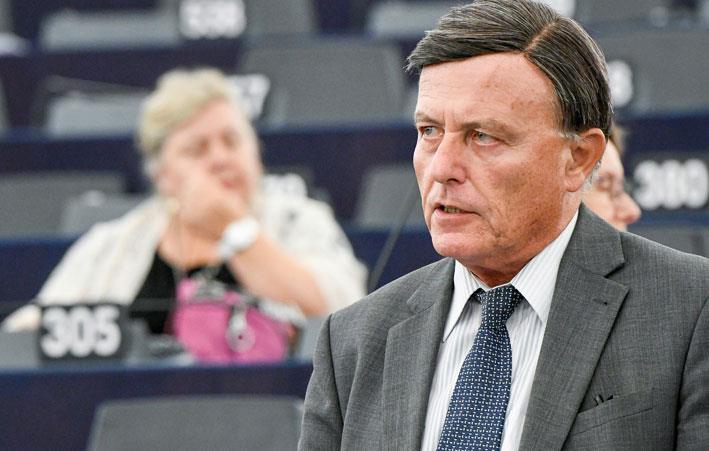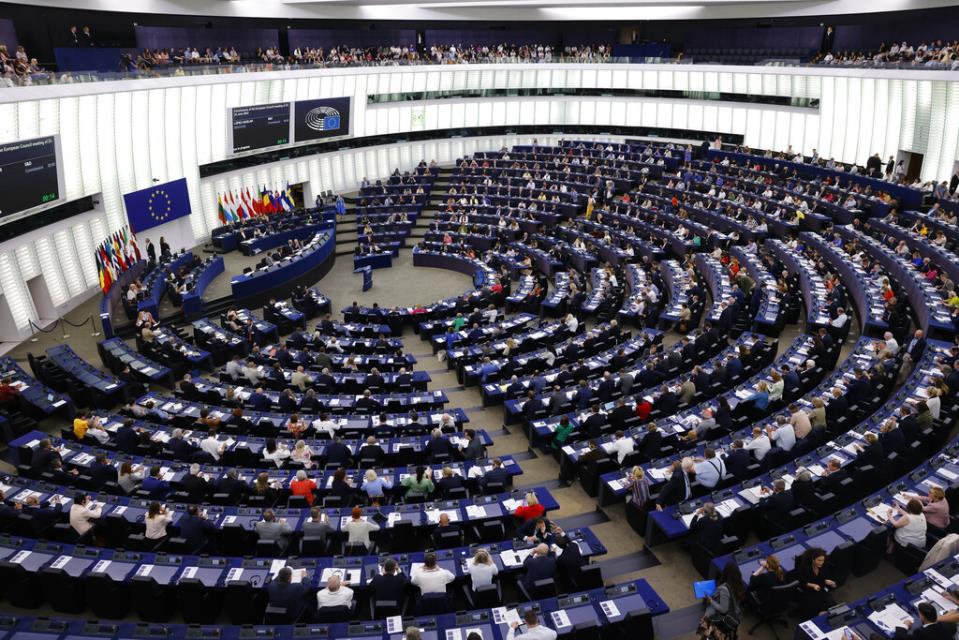Following your resignation as party leader, you stayed on as an MP but did not contest the 2013 general election. It then came as a surprise to one and all when you chose to contest the MEP election. You had led the campaign against membership but now wanted to become an MEP. Some saw it as a contradiction. How do you explain this?
Frankly, I have always found this kind of query puzzling. Did all those who made and still make it expect the people who were convinced that EU membership was not a good idea (and had voted against it) to be politically neutered and to keep away from political activity, now that Malta was in the EU? That would have covered almost half of the Maltese people. Was it not evident that Labour and Labour-leaning people whose party had accepted the verdict of the electorate would continue to strive as well for what they believed in within the structures of the EU, now that these had expanded to regulate Maltese affairs? Did critics expect all representative and decision-making roles within the EU assigned to Malta to be allocated to the PN, as it had stood for EU membership? That would indeed have been a glorious achievement for Maltese and European democracy.
In 2009, Joseph Muscat suggested that I could be a candidate for the European Parliament elections of that year. I was not interested, not least because I believe that in principle, an election mandate has to be followed till its end date. In subsequent years I continued, as I always have done since the 1970s, to follow EU affairs closely. During the 2008-2012 financial crisis, I wrote extensively in the media and intervened frequently in the Malta Parliament on developments in the eurozone crisis and the consequential legislation that had to be passed. In 2012 I actually published a book on the subject "Malta and the Euro". Fully expecting that post-2014, there would be interesting deep changes on the euro front, I accepted the still open offer to be a candidate for that year's EP elections. However what I expected did not happen - over the last ten years, euro policies have been treading water.
To be honest, as an MEP I did not consider myself as a European MP but as a Maltese member of the EP basically focussed on the national interest. For that reason, I never sought any EP appointment even when it was easily available. So right through I have always been consistent with my views on the EU as seen from the Maltese context.

You have worked in the EP for 10 years. It has not made you change your mind about Malta's membership. You're still convinced that the partnership idea was the better option, and you have said that your biggest political disappointment is the referendum loss. But is there something that, in these last 10 years, made you think that it's good that Malta is an EU member. If yes, what is it?
I never said that my biggest political disappointment was "loss" of the referendum about the outcome of which I never shared that assessment. The disappointment related to the outcome of the election which followed. Similarly I never said, as you imply, that membership would be all negative. I argued that membership would bring benefits and disbenefits, and that the latter would largely outweigh the former, which I still consider to be the case, compared to the benefits/disbenefits balance that would have accrued from the option that Labour proposed.
So among the benefits have been: easy access in free trade mode to the European continental market but this was then undermined by the simultaneous adoption of customs union and single market conditions, which partnership arrangements would have excluded or mitigated; access to the Schengen system of free movement; participation in the Erasmus programmes; a greater interchange between Maltese citizens and young people and their counterparts in Europe. The last three benefits would also have been achieved on the back of a partnership arrangement, not least given the huge communications breakthroughs that occurred during the last twenty five years.
Twenty years have passed since Malta became an EU member, and although this had its benefits, such as the hefty funding which saw successive governments use in a myriad projects, there were disappointments too, such as the lack of assistance from the EU when it comes to migration issues. Were there other disappointments for you?
I always find references to "hefty" funding from the EU as another instance of how in this area we continually miss the wood for the trees. True especially in the initial years, there occured "hefty" transfers of open financial grants that in a few years became transformed into funds for project tied allocations on a co-financing basis between Malta and the European Commission. The latter needed to first be vetted and approved by the Commission according to EU pre-determined criteria (like: they needed to fit the overall policy priorities defined at EU level).
In the meantime, under EU rules that naturally are/were part of the membership arrangement, Malta has been paying into the EU budget its share of contributions. This has been climbing steadily till the point has been reached where all things being equal, we put into the EU kitty more than we get out of it, or close to that. Admittedly, Maltese governments up to now have been adept at wriggling out extra funds when the long term 7 year financial frameworks for EU funding are laid out. I reckon this has happened because in the final analysis, our requirements are so limited compared to that of other members, that they can "easily" be accommodated as small change. Nothing can assure us that this kind of play will continue in future or that such handouts will not be made conditional on Malta accepting to satisfy EU trends, like in taxation or defence policies.
Regarding the project tied funds, an additional complication has been that since they needed to be cross-border in scope... which is quite difficult given that Malta is an island... For a number of years they tended to be concentrated on the building of "modern" infrastructural main roads and flyovers, ostensibly to reduce traffic congestion, but in reality serving to encourage car usage. Thankfully in recent years, EU criteria have widened to include digital and Green Deal proposals which has provided better avenues through which Malta can drive its part-financed EU capital projects.
However on a wider front... the wood not just the trees... and it was to be expected... EU membership has resulted in a drastic revision of our terms of external trade. It has led to a huge deficit in the trade accounts for goods in external trade that more than overshadows the incoming project investment flows. We get told not to worry about this because financial and tourism services more than make up for the deficit. But precisely... progress in these sectors (for which single market rules are minimal) really has had nothing to do with EU membership, though they needed to adapt to it.
So rather than "disappointments", I would prefer to discuss issues where the expectations of Malta's governments were not and could not be satisfied by the EU system. Immigration is one of them where the acquis that we accepted on joining the EU obligated the assumption of burdens that grew steadily post-membership in ways that were not envisaged at the point of accession. Changing this situation hit the limits of how far the rules we have accepted could go, and this when we were not alone... In the defence of their national interests, other member states have up to now blocked any effective solution to the problem of member states at the Union's frontier that would be based on a "fair" shareout of the burdens that these have to carry. But the nay-sayers were well within their rights as per the rules.
Actually if one really has to talk about "disappointments", in my view - apart from how the euro "deal" panned out for Malta - the big one was the UK's secession from the EU. As the biggest island with a national status, the UK - especially under the Tories - most of the time fronted policies that went in the same direction as Malta's, like for taxation, financial services, capital markets union, defence and immigration. Its departure has immeasurably weakened the weight of negotiating positions that are Malta-friendly in EU deliberations.

Some argue that the EU should have been more forceful in its stand against Malta's selling of passports, since a Maltese passport is now a gateway into Europe. You had defended Malta's position but later said that the government should phase out the scheme. The idea of selling citizenship was sold by the Labour Party as one that would bring in much needed money. The EU has taken Malta before the European Court of Justice. Do you think the passports scheme was beneficial to Malta and its image?
I have never been in favour of the passport "for sale" scheme. When asked for my advice prior to 2013, I made it clear I did not like it and had done so on previous occasions as far back as 1996-1998. I still think that despite the financial "advantages" that it brings with it, the scheme devalues the national identity and had better be phased out.
But it has always been clear to me that others could legitimately have a different political evaluation and that a Malta government, PL or PN, has the right to institute such a scheme. Indeed there are good grounds to argue that it was/is more honest and clear than how most EU member states manage the way by which they grant citizenship to foreigners. Their processes are secretive, based on murky "national interest" grounds devoid of all transparency and accountability. In the case of Spain's open offer to give citizenship to Jewish people who can prove their descent from Spanish Jews exiled from that country five centuries back, it has promoted a brisk trade in the creation of genealogical tables that no doubt have provided comfort to individuals with credentials as dubious as those of Russian oligarchs. Meanwhile, member states operate residence schemes that can be criticised on grounds equivalent to those set out against the citizen-for-sale schemes, but are not.
In my view, the European Commission stands to (and should) lose its case against Malta at the ICJ on this issue.
Part 1: The 1981 election and the transition from Mintoff to KMB
Part 2: The 1980s’ bulk-buying system and public sector employment
Part 3: The Church schools battle and the 1987 constitutional amendments
Part 4: The post-1987 election years and the rise to the Labour leadership
Part 5: A new image, the anti-Vat position and the Cittadin Mobil
Part 6: The freezing os Malta's EU application and the VAT-CET changeover
Part 7: The clash with Mintoff and the collapse of the government in 1998
Part 8: The return to the Opposition benches and the EU referendum
Part 9: Malta's first years as an EU country and the 2008 election
Next week: Alfred Sant's views on how Maltese MEPs work in European institutions